Ellen Cassedy: We Are Here: Memories of the Lithuanian Holocaust
October 23, 2012 by David
Filed under Non-Fiction, WritersCast
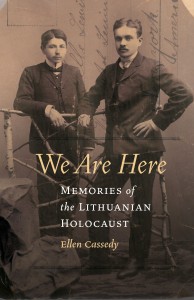 978-0803230125 – University of Nebraska Press – Paperback – $19.95 (ebook versions available at variable lower prices)
978-0803230125 – University of Nebraska Press – Paperback – $19.95 (ebook versions available at variable lower prices)
Finding this book was a happy accident for me. Much of my own family is from Lithuania and I have long been interested in the history and culture of the Jewish community prior to World War II. I’ve read a number of books by Jews who survived the Holocaust in Lithuania – terrible stories of suffering and loss. But Ellen Cassedy’s story resonated even more deeply for me. She went to Lithuania to study Yiddish as part of her quest to connect to her Jewish roots on her mother’s side and to explore the country and culture of her family’s birth.
She also needed to learn some of the secrets of her Holocaust survivor Uncle’s past, and as she explored and connected to Jews and gentiles alike, her experiences in modern Lithuania changed her perspective and understanding of the complex connections between people, their history, and their present. Much of what she believed was true about Lithuania as well as her family’s experience in the terrible war years was upended by what she learned and the people she met and interacted with there.
Cassedy’s story should be meaningful not just for Jews seeking to understand their European roots. Through her eyes, we learn a lot about her hard work in trying to master the complexity of the beautiful and difficult Yiddish language. She spends time with old people, young people, survivors, witnesses, goes through old Lithuanian and Russian archives, interviews city and country folk, including an old man who wants to “speak to a Jew” before he dies and learns a great deal about the issues that confront a country that was taken over by both Nazi and Soviet dictatorships. In the end, her journey transforms her, and in this memoir she allows us to travel with her through a difficult and rewarding emotional and physical landscape. I truly enjoyed this book and talking to Ellen about it was a pleasure. And I learned some new Yiddish words and expressions too!
Her own website is well worth a visit – nice video of Lithuania and more about her other work.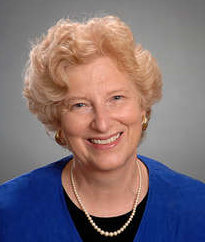
Podcast: Play in new window | Download
Ilyon Woo: The Great Divorce
November 18, 2010 by David
Filed under Non-Fiction, WritersCast
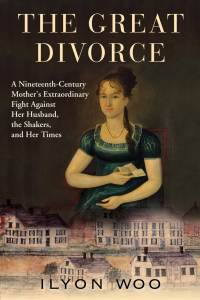 978-0802119469 – Hardcover – Atlantic Monthly Press (ebook versions available $9.99)
978-0802119469 – Hardcover – Atlantic Monthly Press (ebook versions available $9.99)
Ilyon Woo’s The Great Divorce: A Nineteenth-Century Mother’s Extraordinary Fight Against Her Husband, the Shakers and Her Times is an absolutely terrific work of historical narrative. The book tells the story of Eunice Chapman, whose husband left her, taking their children, to join the Shaker community near Albany, New York in 1814.
At that time, women had virtually no rights in society. Upon being married, they literally lost their identities, which were subsumed completely into the legal identity of their husbands. So when Eunice’s husband joined the Shakers, a radical Christian sect that espoused celibacy, communal living and the literal separation of the sexes (ironically giving women a much greater role in their communities than was common in the larger society), she had no legal way to gain custody or even visitation with her children. Rather than give up her children to her husband and a religious community with whom she did not agree, she fought her husband and the Shakers for the return of her children.
Ilyon Woo tells the story of Eunice Chapman’s years of struggle to regain her children, which is amazing in itself, given the barriers she had to overcome, not to mention the difficulties of time and distance, which made everything slower and more complicated to resolve. But of course this is also a social history of an era many of us know very little about. It’s a period when women are only just beginning to exercise social power, 30 after the establishment of the United States as a country, 100 years before women win the right to vote.
Through the lens of Eunice Chapman and her heroic struggle, Woo is able to bring this period vividly forward. We learn a great deal about the Shakers, their history, many of the individuals who made the Shaker sect at least temporarily a very successful, though highly controversial religious and social community, and the nature of their daily lives. And her portrayal of the city of Albany and the New York state legislature is absolutely terrific. Woo succeeds in highlighting individual human beings living their lives within the social and historical sweep of their times. There’s a great deal of research here that has been transformed by imagination and her terrific sense of story into a vivid portrayal of an otherwise obscure piece of social history.
This is Ilyon’s first book. I wanted to talk to her about what got her interested in this subject, and learn more about the kind of research she did to be able to tell this story. And also to learn more about how she feels about this period and the people she wrote about. It’s an amazing story that can and should help anyone faced with any challenge find it easier to rise to the occasion, especially since this is a story with a true happy ending.
Ilyon Woo’s website is here. The site features a video about the book, links to more information about the Shakers, and a really interesting tab about the dramatic readings from the book that the author has organized. Here is my favorite quote about the book: “By delving so deeply into the sources, Woo brings the past to life in all its wonderful strangeness, complexity, and verve. This is what history is all about.” —Nathaniel Philbrick, winner of the National Book Award.
Podcast: Play in new window | Download
Publishing Talks: David Wilk interviews Jim Mairs about The Red Book
July 11, 2010 by David
Filed under Publishing History, PublishingTalks
 In this series of interviews, called Publishing Talks, I have been talking to book industry professionals about the future of publishing, books, and culture. This is a period of disruption and change for all media businesses. How will publishing evolve as our culture is affected by technology, climate change, population density, and the ebb and flow of civilization and its economics? Publishing Talks interviews help us understand the outlines of what is happening, and how we might ourselves interact with and influence the future of publishing as it unfolds.
In this series of interviews, called Publishing Talks, I have been talking to book industry professionals about the future of publishing, books, and culture. This is a period of disruption and change for all media businesses. How will publishing evolve as our culture is affected by technology, climate change, population density, and the ebb and flow of civilization and its economics? Publishing Talks interviews help us understand the outlines of what is happening, and how we might ourselves interact with and influence the future of publishing as it unfolds.
These interviews give people in the book business a chance to talk openly about ideas and concerns that are often only talked about “around the water cooler,” at industry conventions and events, and in emails between friends and they give people inside and outside the book industry a chance to hear first hand some of the most interesting and challenging thoughts, ideas and concepts being discussed by people in the book business.
After nearly 40 years with W.W. Norton, former v-p, senior editor and director of production Jim Mairs left the company in 2002 to found his own company, Quantuck Lane Press, which is distributed by W.W. Norton. He is mainly responsible for the existence of this stunning and important publishing project, The Red Book. This is how it is described in the Norton catalog: “The most influential unpublished work in the history of psychology.”
And this is Jung himself, describing his work on this book from 1914 to 1930:
“The years, of which I have spoken to you, when I pursued the inner images, were the most important time of my life. Everything else is to be derived from this. It began at that time, and the later details hardly matter anymore. My entire life consisted in elaborating what had burst forth from the unconscious and flooded me like an enigmatic stream and threatened to break me. That was the stuff and material for more than only one life. Everything later was merely the outer classification, the scientific elaboration, and the integration into life. But the numinous beginning, which contained everything, was then.”
I’ve had the pleasure of knowing Jim Mairs for many years and wanted to talk to him about the “inside story” of this incredible publishing project, from the physical to the almost spiritual elements of the project. For anyone interested in the way truly special books can still be published in this modern era of publishing, or for anyone interested in The Red Book as an icon of Jungian psychology, I hope this discussion will be valuable and interesting, as it was for me.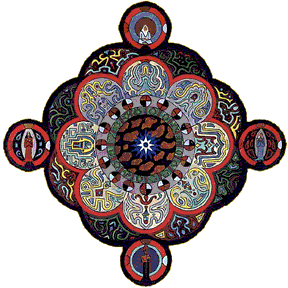
Podcast: Play in new window | Download
Katharine Weber: True Confections
April 15, 2010 by David
Filed under Fiction, WritersCast
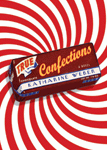 978-0307395863 – Hardcover – Shaye Areheart Books – $22.00
978-0307395863 – Hardcover – Shaye Areheart Books – $22.00
What a fun (and challenging) book! Any novel that takes place in my favorite city, New Haven, Connecticut, is a book I will want to read. And I did really enjoy reading this book. Katharine Weber has created a wonderful main character, the complicated and challenging Alice Tatnall Ziplinsky, who has married into the family that runs the famous Zip’s Candy Company. True Confections is her story, and through her, it is also the story of an immigrant family in America, the romance of candy, family secrets, and the complexity of relationships. Because the entire story is told by Alice, we don’t ever quite know what is real and what is not, and we are forced to confront actual meaning of narrative.
So it turns out that this this funny, warm, and sometimes poignant novel masks an underlying depth of transposed loves, where family becomes defined by relationship rather than blood. In fact, almost every important character in the book has to deal with displacement. It’s great to read a book with depth and complexity. As the author says: “… at its heart, True Confections is about timeless and universal themes: love, betrayal, and of course, sweets.” I should also add that fire – of the destructive kind – also plays an important role in this story, so it’s not all about the sugar.
I enjoyed the opportunity to interview Katharine Weber about the novel, her characters, and of course, New Haven, where she lives, and where this novel is set. The book is rich in subjects and so is our discussion; we talked extensively about her novel, New Haven, the unreliability of narrators, candy, Jewish families and their businesses, and of course, candy. True Confections is a terrific novel; Katharine Weber is a fine writer who also knows how to talk engagingly about her work.
Podcast: Play in new window | Download
Andrew Coe: Chop Suey: A Cultural History of Chinese Food in the United States
March 17, 2010 by David
Filed under Non-Fiction, WritersCast
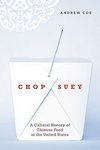 978-0195331073 – Hardcover – Oxford University Press – $24.95
978-0195331073 – Hardcover – Oxford University Press – $24.95
Andrew Coe is a very fine writer indeed – his experience as a journalist shows. Like Mark Kurlansky (Cod, still one of my favorite books among many others he has written), Andrew takes deeply researched historical information and presents them smoothly, telling stories that are packed with fascinating details to bring a subject we think we know into much clearer perspective.
In Chop Suey, Coe takes us on a long journey, beginning in 1784 with the earliest contacts between Americans and China. Throughout, it is hard not to be surprised and sometimes embarrassed by the incredible self centered and disrespectful Americans. At times they were better at understanding and working with the absolute foreignness of Chinese culture and experience than were the Europeans, but only marginally so. At the time the first wave of Chinese immigrants came to America in the mid-19th century, only a few Americans knew anything meaningful or substantive about China and the Chinese, and much of what they did “know” was untrue or seriously exaggerated. And later, American xenophobia reached astonishing heights, as Coe documents, with the now forgotten banning of citizenship to Chinese people who had as much right to be here as any other immigrants.
The gulf of understanding between Americans and Chinese had a great deal to do with the way Chinese food was received in this country, but Coe documents in compelling detail, the way that Chinese cuisine came to become the integral part of the American cuisine that it is today, with over 40,000 Chinese restaurants of many different kinds. With the gradual Chinese migration to the East Coast, eventually New York “Bohemians” discovered Chinese restaurants, and made wildly popular, the seemingly new dish, chop suey. In fact, according to Coe, it was a peasant cuisine from one part of China that came to dominate Chinese-American restaurants.
There are many great stories along the way to where we are today. Coe talks about how American Jews fell in love with Chinese restaurants and in particular makes a great story of President Richard Nixon’s 1972 trip to China and how it opened minds and palates across America. This was a particularly fun part of the book for me. For anyone who loves food of any kind, and especially the intersection of food and culture, this book will be a pleasure to read.
Talking to Andrew was a pleasure. He gives a terrific interview – fully in command of his subject, and really fun to talk with. I think that hearing our discussion will encourage readers to seek out this wonderful book. I am certainly looking forward to his next book.
Podcast: Play in new window | Download
Mary Sharratt: Daughters of the Witching Hill
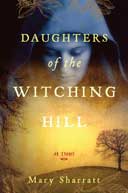
978-0547069678 – Hardcover – Houghton Mifflin Harcourt – $24.00
I really enjoyed reading this book and came to admire its author, not only for her writing skills, which are very good indeed, but because she was able to so deeply and movingly inhabit her characters in a place and time so foreign from our own. Mary Sharratt’s novel is transcendent in many ways. It centers around the years leading up to the 1612 Lancashire, England, witch trials that resulted in the executions of nine supposed witches. Mary Sharratt has brilliantly imagined her story, in which witchcraft is real, albeit not evil in the way the accusers made out. It’s much more complicated – in fact this witchcraft is the folk medicine and healing power of the local spirits of pre-Christian England. Never preachy, Sharratt gives us a countryside where politics and money separate people from one another, and crushing poverty is the lot of so many.
Widowed mother Bess Southerns supports her family and friends by healing the sick, telling fortunes, and blessing those facing misfortune, conjuring charmes that combine forbidden Catholic ritual, medicinal herbs, and guidance provided by her spirit-friend, Tibb. Bess is always careful, knowing the dangers her powers create for her but eventually everything unravels in a series of events that finally gets Bess, her family, friends and supporters into inevitable trouble with the law. Sharratt has crafted a beautiful historical novel that brings this era to life and gives its people she writes about a deep and complex life that many will find surprising. The conflicts between religions, as well as the conflicts between class are here, as well as mystery and suffering and beauty too. The book is set in the English countryside where the author, an American, currently lives. It’s clear to me that Mary Sharratt has allowed this place to inhabit her, as much as she it. She has put together a beautifully crafted story, full of complexity and compelling characters, and even knowing how the book must end, I was hooked from beginning to end.
As a reader I was transported there with her, and found her story uplifting, painful, and beautiful all at the same time. This is a wonderful book.
In my interview with Mary, we talked about her experience as an American living in the English countryside, and how she came to write this book. We talked about the story itself, her characters, their lives, the nature of English witchcraft of the 16th century, power and politics and the warp and weave of her excellent story.
Podcast: Play in new window | Download
Tony Horwitz: A Voyage Long and Strange: On the Trail of Vikings, Conquistadors, Lost Colonists, and Other Adventurers in Early America
November 2, 2009 by David
Filed under Non-Fiction
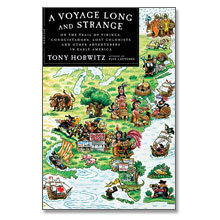 978-0312428327 – Paperback – Picador – $18.00
978-0312428327 – Paperback – Picador – $18.00
What a great book! This is one of those modern nonfiction books by a really smart and talented writer that communicates a great deal of information almost effortlessly. Tony Horwitz takes us on a wonderful journey, his own individualistic, funny, sometimes painful, and always fascinating tour of North American history. It all started with a chance visit to Plymouth Rock that made him realize how little he knew about the early colonization and settlement of North America before the Pilgrims arrival in 1620. It wasn’t long before he set out on a very long journey, as he puts it “in the footsteps of the many Europeans who preceded the Pilgrims to America.”
He traces many stories and visits many places on his own epic trek — from Florida’s Fountain of Youth to Plymouth’s sacred Rock, from desert pueblos to subarctic sweat lodges. Tony has a healthy regard for history and an equally healthy disregard for accepting the accepted wisdom and stories about the Europeans of all kinds who managed to get to America, muck about the place, sometimes with disastrous or horrific results, and he does not forget to talk about the people who were already here when the Europeans arrived. Overall, he is funny, tells great stories, brilliantly illuminates the people, places and myths that dot our past, and while it is trite to say, he definitely brings a long run of history vividly to life. For those of us who do know our American history, this book is fun and rewarding, and for those who missed it, I can think of no better way to learn about this early period of North American history up close and personal than to read A Voyage Long and Strange.
I heard Tony talk about this book and read from it at the Martha’s Vineyard Book Festival this summer and knew instantly that I wanted to read it myself. He definitely has one of the most engaging approaches to history and story telling you will ever run across. Probably reflecting his own engaging personality, as my interview with Tony will show you. He has a great website with alot of information about this, his newest book, and his other four books at www.tonyhorwitz.com.
Podcast: Play in new window | Download
Lev Raphael – My Germany: A Jewish Writer Returns to the World his Parents Escaped
July 19, 2009 by David
Filed under Non-Fiction
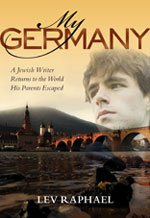 978-0299231507 – Hardcover
978-0299231507 – Hardcover
University of Wisconsin Press $26.95
Lev Raphael grew up loathing everything German. A son of Holocaust survivors, haunted by his parents’ suffering and traumatic losses under Nazi rule, he was certain that Germany was one place in the world he would never visit. Those feelings shaped his Jewish and gay identity, his life, and his career. In “My Germany.” Raphael explores many layers of his personal life, including his visits to Germany, his complex relationships with his parents and his inner self. My interview with this interesting and engaging writer ranges across a variety of subjects, including the author’s writing methods, a discussion about this new book and his life as a writer, the nature of memoir, memory, and the discovery of self.
Podcast: Play in new window | Download
